If you read this site regularly, you’ve already seen GoldenIsThyFame pretty much nail the annoyed feeling us Irish fans have about the imminent prospect of USC ducking out of the teams’ century-long rivalry because playing the likes of Minnesota and Maryland* is already just too darn hard. This presumed move is just the latest negative impact on college football (and yes, selfishly, Notre Dame) for which blame can specifically be placed on the Big Ten Conference.
* In an earlier draft of this post, I name-dropped those two at random, not remembering USC actually lost to both of them in 2024 until I went and looked it up.
Everyone is out for themselves these days; the B1G has just been way more obvious about it
As you know by now, the B1G is, by all accounts, spearheading a change to the playoff that literally no one else wants – a structure that expands the 12-team bracket to 16 and installs four automatic bids apiece for themselves and the SEC.* This would be followed by two bids each to the ACC and Big 12, one to the top non-AQ conference champion, and one to Notre Dame if the Irish finish in the top 16 in the final rankings. With so few at-large bids available (if ND is good enough, there would only be two), all non-conference games would be no-lose (but also no-win) propositions for the biggest four conferences in the sport.
* Even SEC coaches are arguing against this, noting with reason that last year’s playoff would’ve included 6 SEC teams had the bracket been 16. We will see what happens, but it seems like sanity may prevail, with the multiple auto-bid format not one getting much traction outside the B1G.
So why was this proposal made? So the B1G (and SEC) could, in theory, conjure ‘play-in’ 13th games from thin air, matching #3 vs. #6 and #4 vs. #5 in their league standings for the last auto-bids, and sell them to TV networks. It figures; conference title games were created from nowhere for the exact same purpose,* so why not expand the concept? Technically, there’s no rule allowing such games, but since the power conferences make all the rules now, there’s no reason to believe that will stand in the way.
* Very few fans will admit this; for some reason people still believe Moses brought conference title games down on tablets from Mount Sinai and anyone who doesn’t play in them is a bunch of cowards. Meanwhile, Ohio State, who failed to qualify for its league’s title game, just won the national championship – the third champ in 14 seasons to not play a 13th regular-season game. The SEC’s is literally the only conference title game that’s run continuously for 20 years – practically a blink in CFB history – and then-commissioner Roy Kramer made no secret of the fact it was done for TV money.
It’s just another example of how conferences have (d)evolved from their original concepts – like-minded universities creating regional scheduling alliances – into media rights conglomerates in pursuit of nothing besides whatever will bring them the most money next academic year.
There is no long-term view, no concern over how the sport at large would benefit. There is only “cash, cash and more cash, right now, and sooner if possible.”
This isn’t anything new for the B1G, of course. In fact, it’s standard operating procedure. The league likes to sell itself as somehow being better or more upstanding than the unwashed masses playing college football, yet over the last 20 years alone, the conference has:
- Ended longstanding traditions of not playing night games in November, or games after Thanksgiving, for more TV money – though they’re happy to allow the biggest names in the league to just flat-out refuse to do the former, which is about a half-step short of outright defrauding NBC, which pays them a ton of money to broadcast B1G night games.
- Kicked off the 2010-12 realignment madness by taking Nebraska from the Big 12 so they could have a conference championship game and get more TV money.
- Added Rutgers and Maryland – two completely worthless football programs – in 2014 for no reason at all other than to goose cable fees in those schools’ regions for their network and earn them more TV money.
- Hilariously grandstanded about canceling the 2020 pandemic season in a last-ditch effort to convince people they cared about anything other than TV money, before reversing course almost instantly when they realized not everyone was going to follow their lead and they’d lose out on TV money.
- Hilariously grandstanded again when the SEC took Oklahoma and Texas from the Big 12 by forming a so-called Alliance with the ACC and Pac-12 that did exactly nothing.*
- By decree from their corporate overlords at FOX, blew up the fake Alliance and destroyed the Pac-12 by taking USC and UCLA, spent a year hedging on taking Oregon and Washington because they didn’t want to be seen as killing the Pac-12 (apparently this was unironic, even though they already had killed it), then took Oregon and Washington anyway to finish off its former partner conference – for, you guessed it, more TV money.
- Just to provide the final confirmation that literally nothing matters to them besides immediate influxes of TV money, did not take Cal and Stanford while tearing the Pac-12 to pieces, even though the B1G universities claimed to want them, because FOX said the other 18 schools would have to take a little less TV money to facilitate that move. Cal and Stanford instead joined the ACC at an extreme discount, taking minimal media rights distribution.
* It might have done one thing – delayed the 12-team CFP’s implementation by a year. Because good things happen to bad people, this led to Georgia being left out of the 2023 playoff and a certain team from the B1G winning it.
This wouldn’t be the 1st time the B1G was a main reason for the end of an ND rivalry
In between all of this, the conference also played a primary role in the end of ND’s annual matchups with Michigan, Michigan State and Purdue by going to nine conference games back in 2016; coincidentally, this is yet another move conference fans try to pass off as being about competition as opposed to what it actually was about, which was bringing in more TV money. I’ve lost count of how many times some derivative of ‘cowardly’ has popped up on the Internet as to why the SEC instead plays 8 conference games and mandates a non-conference power-league foe, even though that scheduling format almost always produces a tougher schedule than 9 B1G games.*
* Worth noting: Three of the four B1G teams in the playoff last year had zero other power-conference teams on their schedule (Penn State did beat West Virginia). I do give Oregon a pass because they played CFP team Boise State and continued their traditional rivalry with Oregon State. Ohio State and IU had fewer excuses.
Because B1G schools all wanted to keep playing 7 home games a year under this restriction (which apparently they have to do or little Timmy will get tossed down a well), that meant they had room for only one road non-conference tilt every two years, and none of them wanted to lock Notre Dame into that spot ad infinitum. Despite prevailing opinion, it’s no coincidence they all stopped being annual sights right around that time – though ND has played each of them twice since then, and there are future games scheduled against all three.
Funnily enough, the USC discussions of the present day bear a striking resemblance to what happened to the Michigan series a decade-plus ago. ND was very aware that Michigan’s doofus of a then-athletic director, Dave Brandon, was already making noise about exercising a three-year out clause in the ND series (that Michigan itself had insisted upon) if the B1G ever went to 9 conference games. Jack Swarbrick decided to get the jump on him and do it himself, keeping UM from snaking an extra home game out of the deal, which was always its intent when it insisted on the out clause.* (He also expertly trolled UM by announcing a home-and-home with Ohio State on the eve of what was supposed to be the final game.) How does USC’s one-year ‘let’s see what happens with the playoff’ extension offer look in that context?
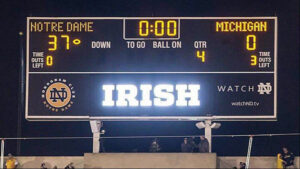
#RememberThe6
* The Wolverines have spent much of the last decade doing a lot of yapping about poultry in relation to this decision. Facts: In the 9 seasons played since the B1G went to 9 league games, Michigan has played exactly one non-conference road game – it was against ND – while buying out a pair of road tilts in that span and playing 8 home games on several occasions. Meanwhile, ND has scheduled series with seemingly half the SEC, plus Ohio State and Clemson. You tell me who was ducking whom.
Meanwhile, in South Bend
I am not saying Notre Dame is some selfless, magnanimous force in college football and that college sports money isn’t important to them. That would be ridiculous. If it weren’t, they wouldn’t be playing football at all. However, three things are beyond dispute:
1) If short-term cash was ND’s sole focus, they’d be in the B1G right now and probably would have been decades ago. While we can’t know exact figures, the Irish would see a healthy increase in their media rights take if they joined.
2) ND has nothing to do with any of the increasingly stupid ideas the power 2 conferences are pushing, and doesn’t want them.*
3) The things ND wants to make money doing aren’t damaging to the sport. Notre Dame wants a system in place that doesn’t stack the deck in favor of certain conferences, doesn’t invent new 13th games left and right, and doesn’t make it pointless to play major non-conference opponents. Who’s against those aims, exactly?
* It’s been reported that the move to the auto-bid laden 16-team playoff that the B1G wants so badly is being pushed over (among others) ND’s objections. Gee, it’s too bad the Irish aren’t in that conference so that can’t be a more common talking point, huh?
The long game (SEC?)
Of course, this all takes place against the backdrop of the fact that the B1G wants – arguably, feels entitled to – Notre Dame in its conference/media rights cabal. The league wants ND enough that it actually has a standing figure (the exact number isn’t known) negotiated into its latest behemoth television contract – you know, the one they and their corporate overlords at FOX destroyed the Pac-12 to get – that outlines what happens if Notre Dame joins. That gives the Irish leverage.
Another bit of leverage ND has on its side is that the B1G isn’t the only game in town. The SEC – hardly innocent in the morass this sport has become, mind you – has increasingly emerged as an unlikely potential ally for Notre Dame, dating to when those two parties helped devise the original 12-team playoff format, both at the time wanting to reserve maximum at-large access.*
* Not that I ever don’t want ND to go 12-0, but it would be particularly delicious to do so this year, given that ND made an honest effort to kowtow to the ‘conference uber alles’ mindset by negotiating away a chance at a bye, enthusiastically endorsing their being reserved for conference champions in the 12-team format. Then Boise State got a bye and the SEC and B1G threw a hissy fit about it, so now ND can get a bye in 2025.
If ND joined the B1G, whatever media rights arms race exists between the two superpower conferences would be over; the B1G would have won it, with no real move left the SEC could make in response. There’s a clear incentive for the SEC not to allow a situation where Notre Dame goes to their rival conference if they can avoid it. Recall also that Disney, which has no relationship with the B1G, is the SEC’s corporate overlord and also the ACC’s, so they have double the reasons not to let ND get away.
It’s not hard to guess that that’s played a role in ND’s recent and upcoming series with Georgia, Florida, Alabama, Texas and Texas A&M (in addition to the recently announced Clemson relationship), series I would anticipate more of going forward. If the B1G was in fact trying to put the screws to ND and force them to join up (the reverse of the move they tried over 100 years ago, when ND desperately wanted in the conference and ended up becoming a national independent only when the B1G tried to blockade them), Pete Bevacqua’s first call could and probably would be to Greg Sankey to see what the SEC could do to keep that from happening. Sankey is many things, but he is creative, intelligent and some would say devious. If there’s a way to come up with a ND-related plan that would benefit the SEC, he’ll be happy to help devise it.
There are historical reasons, of course, that ND shouldn’t ever join the B1G. Anyone reading this likely already knows them. But increasingly, there are pragmatic ones too. Notre Dame and the B1G are, to be frank, ideologically opposed on what they want the sport to look like, with this latest USC and CFP format nonsense the latest proof. The Irish don’t exactly share all of the SEC’s aims either, but it’s fair to say the two are far less at odds.
Also, the SEC is by just about any measure better at football than the B1G, and will continue to be. That seems like a good reason to seek them out for some sort of partnership. What form that would take? I do not know. But I’m in favor of pretty much whatever the parties can work out if they decide to come to the table together, and after the last month in particular, all Notre Dame fans should be.

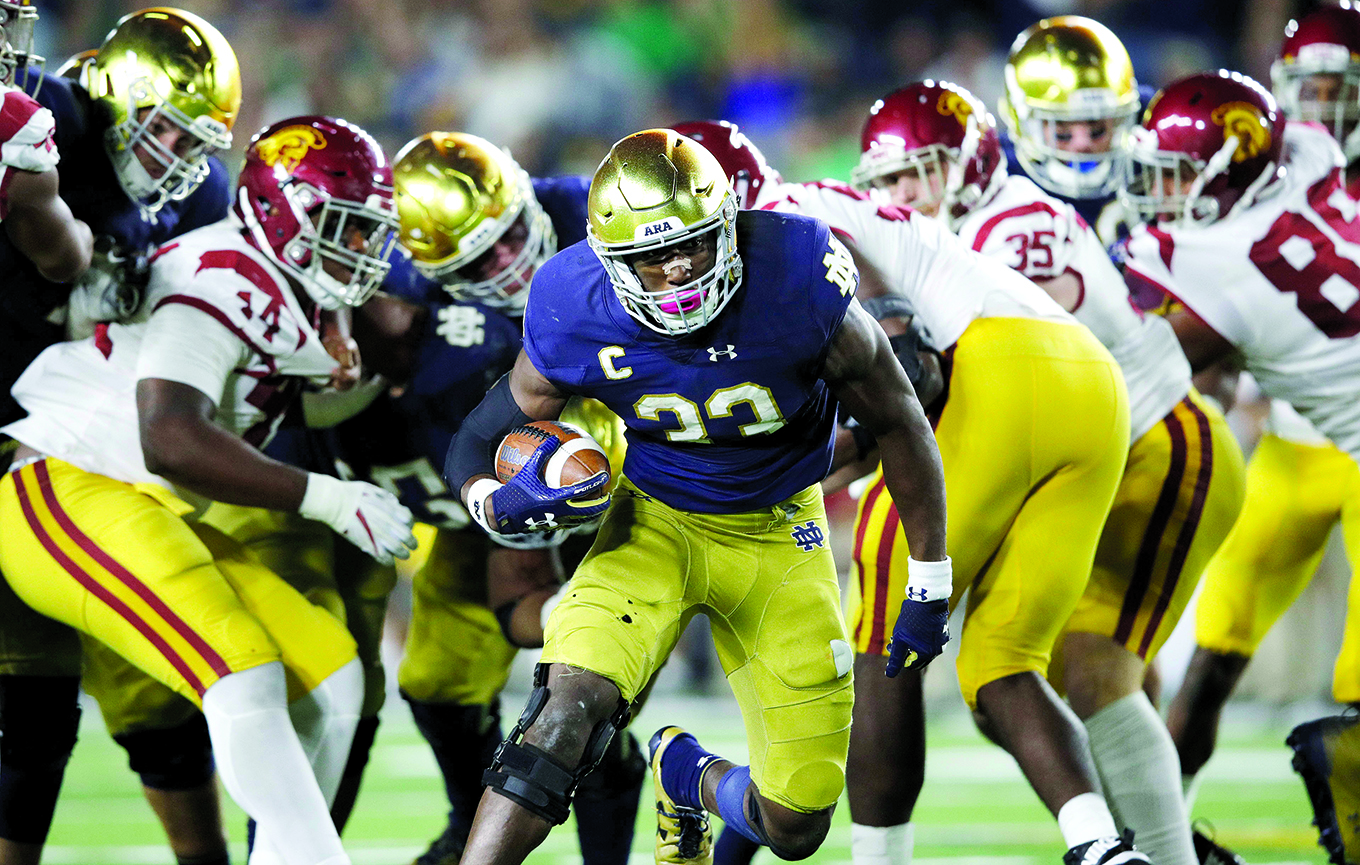
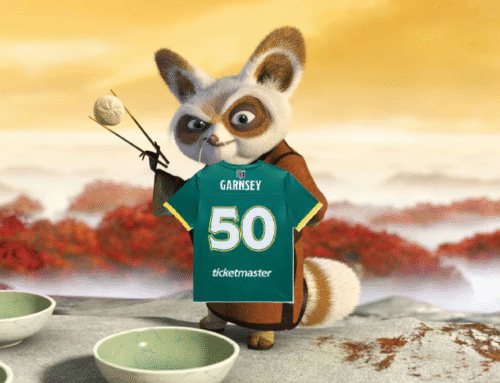
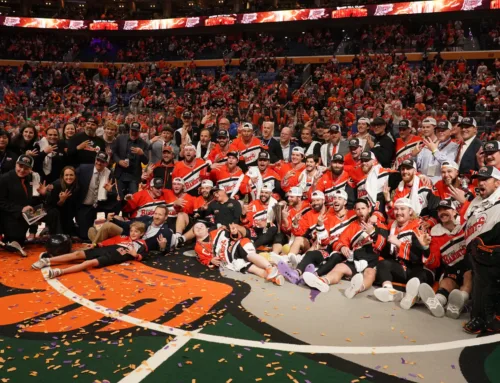
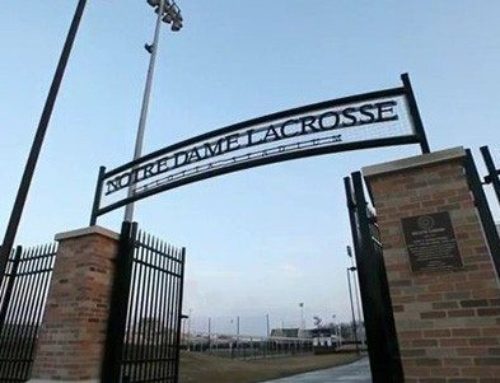
Honestly, if ND had to choose between the BIG and the SEC, it’s kind of like voting for president — try to avoid it for as long as possible, then hold your nose as you choose the lesser of two evils. I am anti-super league and am hoping that the reverse happens, that these two conferences eventually learn that they are too big and end up breaking up
The “ND should join a conference” arguments from other fanbases fall in the category of arguments that fail the more questions you ask of them